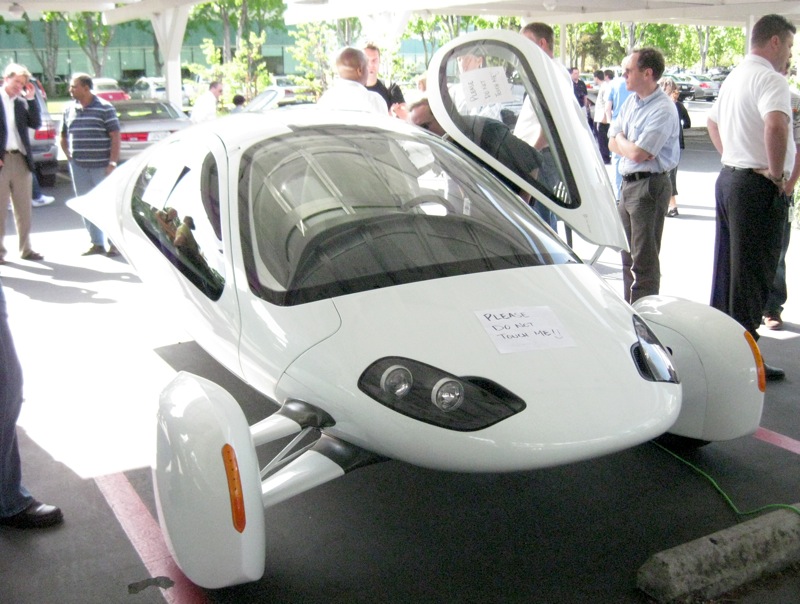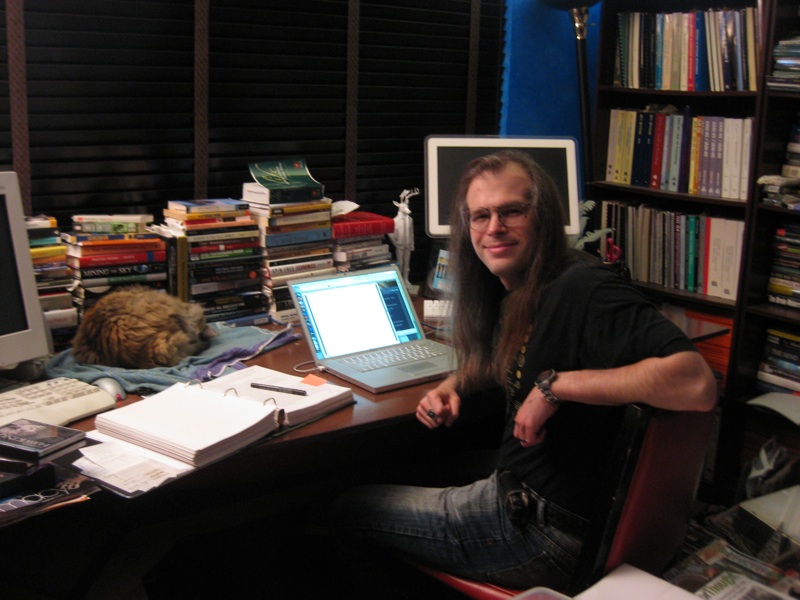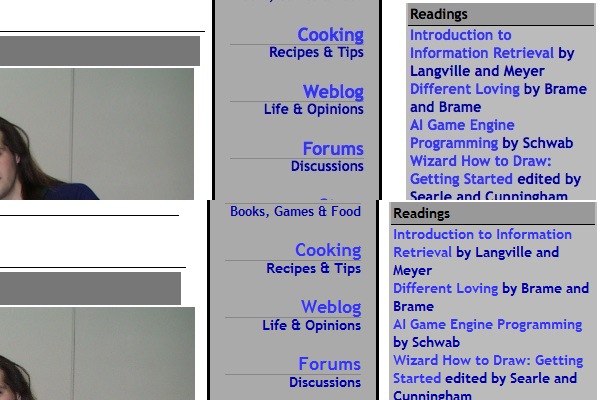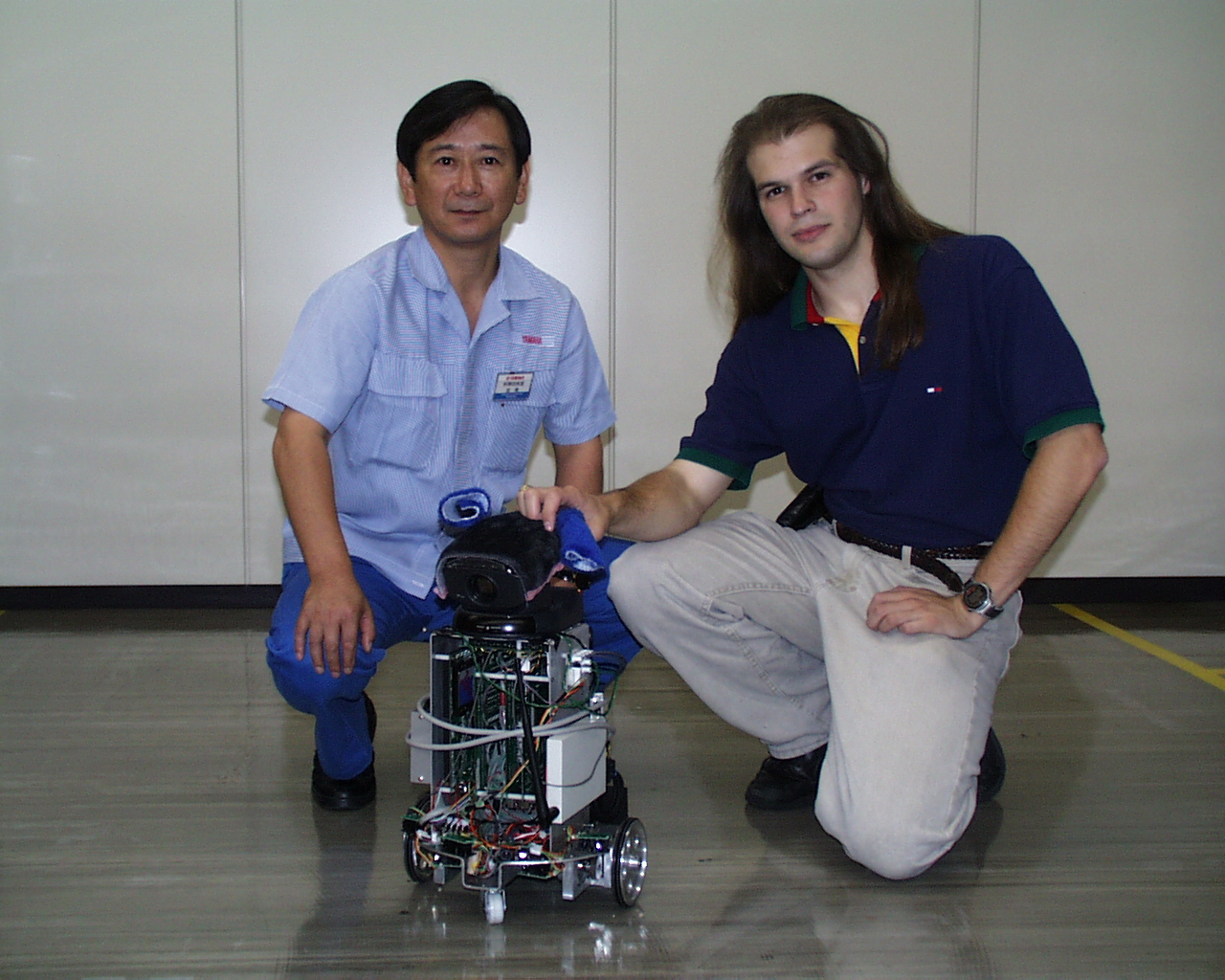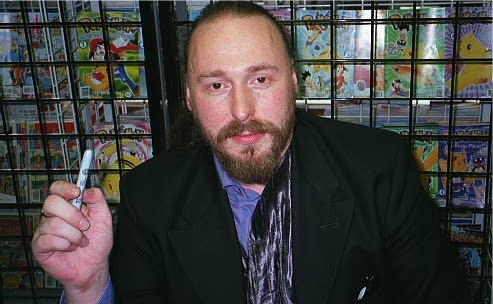It's a fun thing in writer's circles to critique Dan Brown. Let me quote Tom Chivers in the Telegraph, who picked what he thought were
20 of Dan Brown's worst sentences, highlighting in bold one in particular I've heard other writers critique:
4, 3, and 2. The Da Vinci Code, opening sentence: Renowned curator Jacques Saunière staggered through the vaulted archway of the museum's Grand Gallery.
Angels and Demons, opening sentence: Physicist Leonardo Vetra smelled burning flesh, and he knew it was his own.
Deception Point, opening sentences: Death, in this forsaken place, could come in countless forms. Geologist Charles Brophy had endured the savage splendor of this terrain for years, and yet nothing could prepare him for a fate as barbarous and unnatural as the one about to befall him.
Professor Pullum: "Renowned author Dan Brown staggered through his formulaic opening sentence".
Professor Pullum, here, is Geoffrey Pullum, "famous" in my small circles for this
small essay about why he thinks the first sentence of The Da Vinci Code is so bad:
I am still trying to come up with a fully convincing account of just what it was about his very first sentence, indeed the very first word, that told me instantly that I was in for a very bad time stylistically.
The Da Vinci Code may well be the only novel ever written that begins with the word renowned. Here is the paragraph with which the book opens. The scene (says a dateline under the chapter heading, 'Prologue') is the Louvre, late at night:
Renowned curator Jacques Saunière staggered through the vaulted archway of the museum's Grand Gallery. He lunged for the nearest painting he could see, a Caravaggio. Grabbing the gilded frame, the seventy-six-year-old man heaved the masterpiece toward himself until it tore from the wall and Saunière collapsed backward in a heap beneath the canvas.
I think what enabled the first word to tip me off that I was about to spend a number of hours in the company of one of the worst prose stylists in the history of literature was this. Putting curriculum vitae details into complex modifiers on proper names or definite descriptions is what you do in journalistic stories about deaths; you just don't do it in describing an event in a narrative. So this might be reasonable text for the opening of a newspaper report the next day:
Renowned curator Jacques Saunière died last night in the Louvre at the age of 76.
But Brown packs such details into the first two words of an action sequence — details of not only his protagonist's profession but also his prestige in the field. It doesn't work here. It has the ring of utter ineptitude. The details have no relevance, of course, to what is being narrated (Saunière is fleeing an attacker and pulls down the painting to trigger the alarm system and the security gates). We could have deduced that he would be fairly well known in the museum trade from the fact that he was curating at the Louvre.
If you agree with this assessment of Dan Brown's work, you might as well stop reading, because you've completely missed the point of what Dan Brown is doing. In fact, the key to what's wrongheaded about The Telegraph's list and Pullum's critique is contained in the very first sentence I quoted by Pullum:
I am still trying to come up with a fully convincing account of just what it was about his very first sentence, indeed the very first word, that told me instantly that I was in for a very bad time stylistically.
He's struggling to come up with that convincing account because the very first sentence of the Da Vinci Code
wasn't bad. In fact, Pullum's critique inadvertently nails precisely what's great about the opening sentence: it incorporates newspaper style details like the "renowned" status of the curator and his advanced age even into its action sequences, effortlessly, as a way of grounding us in otherwise fantastic action.
At the end of this opening sentence, you not only know an old man is running for his life, you know he's very, very old, respected to the point of being famous, and knows the paintings on the wall so well he mentally categorizes them by artist, even if you personally have no idea who Caravaggio is. And by weaving massive amounts of detail through even the action sequences of the story, Dan Brown establishes an authoritative air which provides the necessary grounding for his fantastic tale of a secret Christian history.
The Da Vinci Code is a great book that attracted millions of readers by sucking them into a great detective story that seemed almost real - and the stylistic elements Pullum critiques above are precisely what enable readers to make that mental shift. I'm not sure why Pullum reacted the way he did, but I strongly suspect that he simply doesn't enjoy pure escapist literature - which is his right - but failed to recognize that was the reason behind his dislike and confabulated these erroneous rationalizations to justify that dislike - as the human mind so often does.
Similarly, both the Telegraph list and some critiques I've heard in writing groups sound like the blind application of writing workshop rules. But "rules" like "show, don't tell" aren't hard and fast rules; they are guidelines designed to help authors, and moreover guidelines whose importance changes as writing styles change. And if you read widely and deep, you'll find that a vast number of "great authors" and "classic works" violate each and every rule you can find in a writing workshop - or repeat many of the sins Pullum and Chivers outline above.
The Da Vinci Code is ridiculous escapist nonsense. But that nonsense is anchored by a fantastic-in-every-sense-of-the-word idea and grounded by what to an average person would seem like an immense amount of erudition. Brown's research will not satisfy experts in an area, and it still is escapist nonsense - but it is immensely well crafted escapist nonsense. If what The Da Vinci Code is is not your bag, then just say "I don't like The Da Vinci Code, because it took itself entirely too seriously for a bit of escapist nonsense" and leave it at that; don't feel the need to impugn Dan Brown's talent.
To finish, let me quote Chivers #1 bad sentence:
1. The Da Vinci Code: Title. The Da Vinci Code.
Leonardo’s surname was not Da Vinci. He was from Vinci, or of Vinci. As many critics have pointed out, calling it The Da Vinci Code is like saying Mr Of Arabia or asking What Would Of Nazareth Do?
This analysis is so bad, I'll just let it speak for itself. Oh, no, I won't. If by some chance you actually agree, stop and think for a moment until you realize what is so very, grievously wrong with what Chivers is saying here.
For the rest of us ... well, first off, "Da Vinci" does not read as "of Vinci" in English. And we're reading English here; and English can (and frequently does) go and appropriate any string of symbols it wants to refer to anything it wants, regardless of whether that string of symbols would make sense if it was transliterated. A brief search of Google or Amazon will reveal just how many people use that brief two-word string which now distinctively identifies that man. Your brain is designed to understand "The Da Vinci Code" as referring to the context of Leonardo Da Vinci. Get over it.
But more importantly, most of the rest of us can immediately recognize why "The Da Vinci Code" sent Dan Brown laughing all the way to the bank:
it sounds really cool.
-the Centaur
P.S. In a violation of my usual style, I am not going to go obsessively read Leonardo da Vinci's Wikipedia page or dig through my mammoth library. I'm just going to let the essay speak for itself ... and if I'm wrong in some details, I'm wrong.
